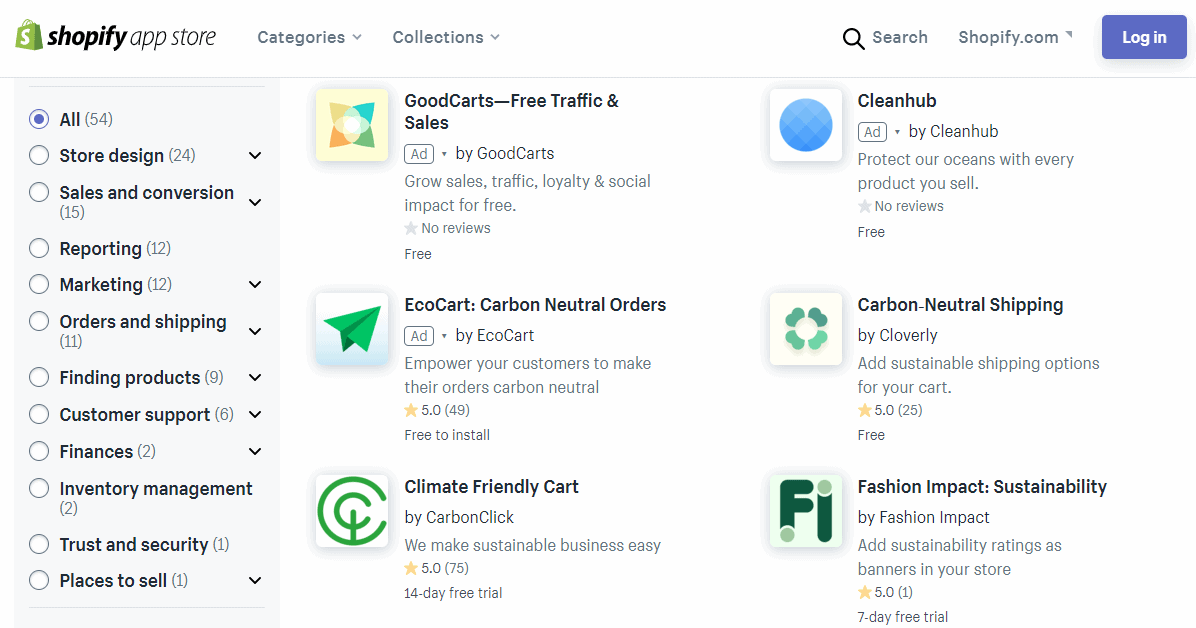This post is an example of our GoodGuide series of in-depth guides to impact retail and ethical ecommerce. Download the PDF version or get all of them by visiting our GoodGuides page.
Introduction
You’re a passionate ecommerce retailer, running a vibrant, values-led business. You believe in your products and the positive impact they’re having on the world. The wider your reach, the more good you can do.
But between sourcing, marketing, stocking and fulfillment, the days fly by. It’s a struggle to find the time to invest in amplifying your impact…
For Shopify merchants, this is where third-party solutions can really come into their own. When it comes to helping add functionality and flair to the ecommerce experience you provide, the Shopify App Store can be a real goldmine — helping you reach, serve and delight as many customers as possible.
Of course, as an ethical retailer, you want to work with reputable apps that share your values. This GoodGuide offers a handy way to help you navigate the Shopify ecosystem, finding solutions that aren’t just good for your bottom line, but also align with your ethics.
The ethical Shopify app space is really starting to take off. So do your research, dig into the many options that are becoming available, and see what might work best for your unique business requirements.
Shopify Apps to Boost Sales and Your Impact Mission
Read on to learn more about a handful of apps that could help you do good and spread a positive, proactive message.
1. Apps to Consider for: Effortless Carbon Offsetting
Carbon offsetting is — if you’ll forgive the unfortunate turn of phrase — a truly hot topic within modern ecommerce. Debate and scientific study still rages over the environmental effects of ecommerce compared to traditional brick and mortar stores, but there’s no doubt that online retail could be working harder to reduce its impact.
The area where ecommerce arguably has the most carbon on its hands is shipping. “Last mile” deliveries, where emissions look set to increase by 30% within a decade, are especially problematic.
While brands can (and should) make efforts to reduce this impact at the source, a new breed of offsetting apps are also on hand to help retailers mitigate their carbon footprint, with the minimum effort and cost.
Seamlessly integrating with your store, many of these apps offer the chance for customers to offset their delivery emissions through a small additional charge to their order. If your brand would rather bear the financial impact, you can also opt to pay for the offsetting yourself (letting your customer know that this has been done on their behalf).
Great for the Planet
Neutralizing the impact of carbon emissions linked to each purchase has several benefits for our planet. Not only are customers’ actions offset, they’re also educated and made more aware of the impact of their purchases.
As a platform, Shopify is deeply committed to carbon neutrality, and has taken several internal measures (such as switching to cloud-based servers which run on renewable energy) to cut emissions.
With this in mind, it shouldn’t come as a surprise that the platform recently announced its own solution to merchant carbon offsetting. In addition to its standalone Offset app (which is free to install, but incurs a low per-order charge), Shopify’s Shop app offers integrated carbon offsetting for every purchase made in-app — at no cost to the retailer or consumer. In addition to the other benefits brands can experience selling via Shop, this is a huge gesture from Shopify. There should be very few blockers to getting this up and running, so you can offer your customers a guilt-free shopping experience each and every time.
Other apps put the decision and purchase into your customers’ hands. Climate Friendly Cart by CarbonClick, for example, gives a prompt at checkout for a small additional amount to be added to the bill. This goes to help trusted carbon offsetting projects, such as reforestation and renewable energy projects. Carbon CheckOut offers customers the chance to track their offsetting over time via a personal Carbon Portfolio, which follows funded projects in real-time.
Great for Your Business
Ecommerce audiences are increasingly aware of and concerned by the environmental impact of shipping, so being able to shout about this is important, and hugely advantageous to merchants.
Socially conscious marketing represents the future of promotion, and carbon offsetting should be built into your promotional work and marketing campaigns. Give your brand value a significant boost by showing your alignment with one of the most pressing issues of our time.
Most apps come with design assets such as site badges and banners to help you promote your involvement, so make sure your commitment to the cause is well-publicized and visible.
Depending on your choice of partner, many apps come with additional benefits too. Climate Friendly Cart, for example, offers businesses an additional revenue stream as 10% of offsets sold going into a rebate fund. And carbon offsetting is just one feature of Shop, which is more broadly designed to help boost loyalty and accelerate conversions through improved, curated customer experience.
You Might Like to Check Out
2. Apps to Consider for: Enabling Donations
A growing number of apps in the Shopify ecosystem make it possible for stores to enable and encourage charitable donations as purchases are made. It’s possible to round up, offer a percentage to charity, pick a charity for a donation of X amount if the customer spends Y amount, and more.
As you have many app choices with similar and unique features, it pays to shop around and explore which tactics would best fit your own use case and audience.
Give & Grow Donations by Pledgeling is used by many household names, both in the corporate world and non-profit sector (such as Red Cross, Girl Up and Habitat for Humanity).
This solution enables donations to be made either by the customer (e.g. rounding up a bill for charity and/or adding an additional $1), or by the merchant. With the latter option, you can choose to give either a percentage or fixed amount per product. The app enables the giving process to be integrated directly in the checkout experience and gives retailers the opportunity to showcase specific products by linking them to causes or nonprofits.
A featured Shopify staff pick, Shop for Good by DailyKarma for example, offers a “Donate For Discount” campaign, helping your customers harness the power of “give and get”.
Another popular option is Change Commerce by ShoppingGives. The PayPal Giving Fund Partner on Shopify, this app also earned an illustrious Shopify Staff Pick in December 2019 and May 2020. Change Commerce is also included in the “Launching your store” app collection, as recommended directly by Shopify.
Great for the Planet
Given the chance, people lean towards generosity and altruism. Barriers to giving are often less a reluctance to part with cash, and more about skipping a complicating donation process. But donation apps make giving quick, easy and convenient, and as we move towards a more cashless society ecommerce can play a big role in keeping good causes afloat.
The donation Shopify apps that we’ve selected work at both a global and local level, so retailers (or customers, depending on your set up) can benefit a huge range of charities and worthy projects, either close to home or on an international scale.
By offering flexible options for donations right at the point of purchase, apps such as these can help to make your audience feel more deeply invested in and connected to the giving experience. By showcasing certain causes, even if your customer opts not to make a donation, you’ve still assisted the charity or cause by providing valuable free exposure.
Great for Your Business
Aligning your brand with a good cause is a hugely effective promotional strategy. A great example of this comes from the wave of recent advertisements released during the Coronavirus pandemic. Those deemed to resonate most deeply with consumers were focused on the good deeds that the brands involved were actively carrying out.
In a similar fashion, enabling donations as part of your customer experience has a dramatic effect on customers’ impression of your brand. There’s a tangible impact on customer LTV (the value a customer will contribute throughout their entire “lifetime”), with a healthy boost to loyalty as shoppers choose to return, encouraged by the feelgood factor that giving creates.
A great example is given here, where Givz worked with a $25 billion retailer to run a promotional campaign offering a $10 charitable contribution for every $60 a shopper spent. Costing a fraction of the standard practice of discounting, the offer proved every bit as popular. A post-purchase email, encouraging customers to pick a charity to donate to, earned the highest open rate of all time for the company — and the engagement rate rose by approximately seven times their average.
According to Give & Grow Donations, donation functionality has also been shown to increase average cart size and average customer spend. This is a great example of “buycotting” – the opposite of a boycott — where consumers actively go out of their way to support brands “caught doing the right thing”. A Cone Communications CSR study found that “87% will purchase a product because a company advocated for an issue they cared about”.
Donation apps such as those included in this Guide are also a great way to make your investment in social good highly visible. It’s easy to show customers how they’re making an impact and you’ll gain access to whole new streams of interesting data such as donation AOV, donation conversion rate and more…
You Might Like to Check Out
3. Apps to Consider for: Enhanced Customer Experience and Cause Marketing
We’ve reserved this chapter for the apps using a variety of different approaches to add something special to your customers’ experience, at the same time as helping benefit the environment or humanity.
GoodCarts represents a simultaneous win for both customers and merchants — discounts for one, new customers for the other. By connecting a wide range of impact committed retailers and enabling them to cross-promote each other via enticing coupons, customers are rewarded for making a purchase. Not only do they benefit from money off future purchases, they’re also exposed to a range of new businesses that are highly likely to resonate with them, thanks to careful targeting. Best of all, GoodCarts is free for vetted retailers in the network.
Earth Rewards is a rewards platform with a difference. Instead of receiving discounts or free gifts, customers can give back to the planet. Each point earned helps protect 2 sqm of rainforest in the Amazon, empowering and encouraging shoppers to reduce their impact on the environment with each and every purchase.
Finally, Sales CountUp offers a really attractive addition to your store, clearly showcasing your impact to customers through a range of well-designed counters. These could illustrate how much you’ve raised for a cause, how much carbon you’ve offset, how much rainforest you’ve protected… the possibilities are endless. The app offers the chance for effective, visually appealing storytelling as you build out your brand and win over new customers.
Great for the Planet
In their own ways, each of these apps offers significant benefits for our planet. GoodCarts is highly effective in boosting the profiles of sustainable businesses, who are in turn encouraging people to “shop for good”. By promoting these types of retailers, the wider cause of conscious consumerism is further promoted. The app connects a powerful community of like-minded people and businesses — amplifying the reach they can attain and helping them work collaboratively.
Earth Rewards takes the proven, winning formula of a loyalty program and channels all of its opportunity towards one eco-friendly mission. By uniting an army of shoppers behind a common cause, they work at scale. Giving back to the environment in this way is particularly cost-effective.
Sales CountUp offers real flexibility when it comes to how retailers might choose to deploy it. Ultimately, however you choose to leverage it, this app is a fantastic way to put social and environmental causes front and center within your store’s design. It will help you keep these crucial issues at the forefront of your audience’s mind and inspire positive action from them.
Great for Your Business
All of the Shopify apps mentioned in this chapter can help you build up customer loyalty. By closely aligning your brand with a cause or values-based mission, you’re setting yourself up for much greater success in the realm of customer approval and retention.
GoodCarts offers a fantastic (and totally free) opportunity to cross-promote to a self-selecting group of highly motivated customers. Your coupons will be sent to customers who have a proven track record of buying from retailers with similarly ethical, sustainable approaches — it’s a marketing campaign that does all the targeting for you!
In addition to enhanced brand positioning and the lift given to loyalty, Earth Rewards gives you access to some valuable new data sources. Aggregated and segmented customer data offers a deeper understanding of your customer base, while their well-designed
analytics dashboard helps you keep track of each campaign’s performance.
Sales CountUp leverages social proof to its full effect. There’s something deeply reassuring about seeing the kind of figures it can be set to display — simple numbers that demonstrate sales, trees saved, satisfied customers, donations made, etc.
You Might Like to Check Out
4. Apps to Consider for: Keeping it Local
From supporting local economies to reducing the impact of emissions from long shipping routes, there’s a lot to be said for keeping commerce local. The Coronavirus pandemic accelerated the growing trend of shopping locally, and even after restrictions ease, people still seem keen to shop within their community.
When it comes to ecommerce — despite the fact that the industry’s success is built on the ability to buy anything, from anywhere, at any time — thinking about how you can serve your local community is still vitally important.
Longer delivery times can be a huge turn-off for customers, so knowing they’re able to save time via a “click and collect” strategy, could be a clincher.
An app like Store Pickup + Delivery by Zapiet, which leads the way for local delivery and store pickup, is perfectly positioned to help here. It’s feature-rich, enabling retailers to perfectly coordinate and customize the logistics surrounding their local order fulfillment.
Previously mentioned in this Guide’s first chapter, Shopify’s Shop app can also help to incentivize and streamline local ecommerce. In addition to helping facilitate 18% surges in conversion rate, the app places a strong emphasis on making it easy to discover and support local businesses.
Great for the Planet
Carbon offsetting is valuable, but wherever possible, businesses can go one better by cutting out that final step in the journey altogether. By enabling local pick up, retailers can play their part in helping keep emissions low and purchase journeys efficient.
By enabling customers to collect their orders in person at a time of their choosing (when they’d already be in the vicinity) stores can contribute towards targeted improvement in terms of local air quality. Wide adoption could mean significant reductions in delivery-based, city center traffic
Local delivery or in-person pick up also often means that less packaging is required, with packages not needing to undergo long journeys. This is a great boost to a business’s sustainability (and doesn’t hurt the bottom line either!).
Great for Your Business
Curbside collection and “BOPIS” (buy online, pick up in store) have seen real growth in the Coronavirus landscape, and the businesses that have built this into their models are benefitting.
Making these options available means a reduced fulfillment cycle — there’s a clear time/cost benefit to customers and merchants alike. They also enable retailers to appeal to new demographics who may want their products but feel concerned about shipping impact or risks. And the benefits in terms of growth are clear cut — retailers using click and collect or BOPIS showed an average growth of 23% in sales.
An app like Shop also helps improve customer experience and business efficiency by providing engaging and accurate delivery information. This means that customers can track their orders live, right to their door — no more frustrating (and wasteful!) missed deliveries.
You Might Like to Check Out
5. Apps to Consider for: Putting Down Roots
Few things are more symbolic of sustainability than the tree. In modern times, the tree has become a unit of environmental goodwill. Shopify’s CEO, Tobias Lutke, is known for his fondness for reforestation and outdid Elon Musk in his tree-planting commitment (literally going “one better” and planting a million and one trees to Musk’s million).
It’s little wonder then that a variety of ecommerce apps have sprouted up to provide a tangible, tree-based solution to rebalancing the impact of our online retail. These vary in their design and approach but the common concept is simple — connect the process of checking out in the virtual world with an opportunity to see a tree (or trees) planted in the real one.
A popular option within the Shopify apps space is Plant Trees with Ecologi. This plugin promises to automate the reforestation donation process. Merchants can opt to plant a tree for every unit that they sell, or for a set amount of revenue generated. Again, by leveraging the scale of the operation, the app ensures that trees are purchased at a very low price — just $0.15 (USD) to plant and protect a tree in Madagascar.
Another option to check out is One Tree Planted at Checkout. This Shopify app gives retailers the choice to plant a tree on behalf of their customers, in addition to enabling them to choose to plant their own, via widget, pop up or directly within the checkout process.
Great for the Planet
Retailers choosing to include this kind of environmental donation, as part of their customer experience, make doing good simple and easy. Trees represent something very tangible, and Plant Trees with Ecologi looks to make the most of this fact, as they offer your customers the chance to measure the growth of their own “virtual forest” over time, as their purchases (and trees) add up.
Tree planting apps also offer businesses the chance to offset their own business impact, in addition to customers’ shipping. To this end, Plant Trees with Ecologi offers business accounts so that companies can make their operations fully carbon neutral.
In addition to providing clean air and capturing carbon, forests also provide employment to over 1.6 billion people worldwide, so the economic and social impact upon reforestation projects should also be borne in mind.
Great for Your Business
Integrating tree planting into your online store has the potential to keep customers feeling great about using your service or products, improving loyalty and extending browse time as they return to see how their virtual forests are progressing.
Tree planting can also help to add a bit more character to your seasonal promotional campaigns (it would be easy to have a little fun around Christmas for example, or to offer an enhanced “one for one” planting pledge to encourage Earth Days sales, as suggested by One Tree Planted At Checkout).
Plant Trees with Ecologi offers a leaderboard, which adds an element of friendly rivalry to proceedings. Build staff morale with a leaderboard challenge (we can’t promise that obsessively checking this won’t impact productivity, but it’s fun!).
You Might Like to Check Out
Conclusion
Ethical ecommerce represents a huge opportunity within the retail space. In the US, 59% of consumers would choose, switch, avoid or boycott a brand based on its stand on societal issues. And research suggests that a 44.5% year on year increase in UK consumers concerned about the impact we are having on the environment, with 29% of those surveyed reporting that they’d started shopping with more ethical, sustainable retailers as a result.
As customers become more demanding, the most successful retailers will be the ones who have optimized all elements of their customer experience for ethical and ecological best practice. In today’s modern market, conscious consumerism goes far beyond the way that products are sourced, produced and packaged.
When it comes to business practices, transparency will be the key to success for companies making headway. By taking time and care to make your efforts visible, and staying truly accountable to these commitments, brands will be able to enjoy a real commercial advantage.
Boosting sales doesn’t have to mean compromising your ideals or ethics. The Shopify ecosystem is a collaborative, supportive space full of many like-minded ecommerce professionals, offering solutions that are ready to integrate and start winning you more business today.
This Guide has highlighted a handful of integrations that could be benefiting your store, customer experience and bottom line in just a matter of clicks. We hope you’ll feel inspired to explore the exciting opportunities they could represent — for your business and the future of our planet.
The journey toward impact through retail need not be taken alone. Let’s grow together.
- Get all of these guides by visiting our GoodGuides page.
- Ready to grow sales, loyalty and impact – for free? See how GoodCarts and our community network approach can benefit your store.
- Join our free Impact Retail newsletter for inspiration and tactical news.
Connect with like-minded retailers via online groups like the Mindful Commerce Facebook Group and Shopify’s own Social Impact Business Community.











